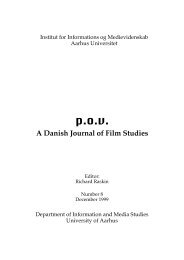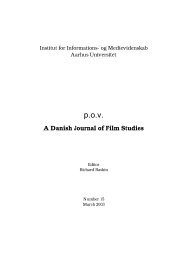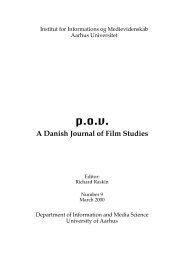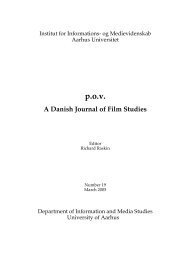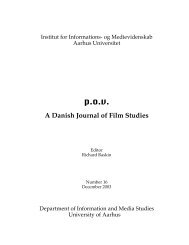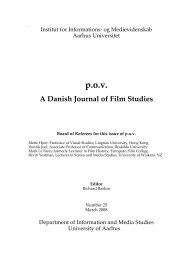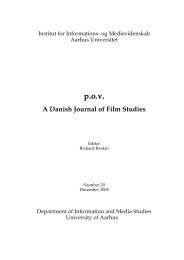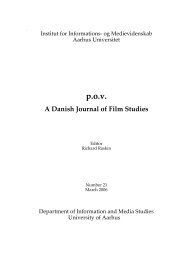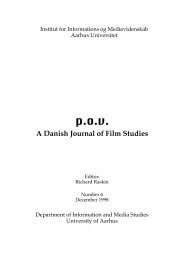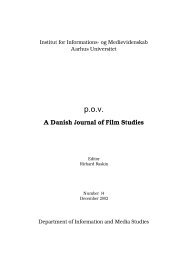The Face of Time - POV - Aarhus Universitet
The Face of Time - POV - Aarhus Universitet
The Face of Time - POV - Aarhus Universitet
You also want an ePaper? Increase the reach of your titles
YUMPU automatically turns print PDFs into web optimized ePapers that Google loves.
A Danish Journal <strong>of</strong> Film Studies 87<br />
sonalized curriculum vitae that round out a life, rather than the<br />
epitaph, or any more expressive summary.<br />
Because <strong>of</strong> the close-ups <strong>of</strong> hands recording facts and exchanging<br />
documents, Urzad seems to somehow anticipate Kieslowski's<br />
legendary choice to "escape from documentary" as well as his subsequent<br />
departure from filmmaking altogether. In Danusia Stok's<br />
interview, Kieslowski relates:<br />
<strong>The</strong>re was a necessity, a need – which was very exciting for us –<br />
to describe the world. We tried to describe this world and it was<br />
fascinating to describe something that hadn't been described yet.<br />
It's a feeling <strong>of</strong> bringing something to life... if we start describing<br />
something, we bring it to life...<br />
[But] Not everything can be described. That's the documentary's<br />
great problem. It catches itself as if in its own trap. 1<br />
Urzad is very much a film about the mundane, the everyday, and<br />
recreates this with Kieslowski's described vitality. But, if the film is<br />
criticizing all the bureaucratic records for failing to adequately contain<br />
or express, with their "yes" or "no" answers, the complexity <strong>of</strong><br />
an individual's life, is the film saying anything about the success <strong>of</strong><br />
documentary film itself in terms <strong>of</strong> measuring up to this task? Is this<br />
the "trap" in Urzad? Unlike the clerk's questionnaire, it is not the prerogative<br />
<strong>of</strong> this film to sum up anyone's life, but since the film explicitly<br />
challenges the assumption that these shelves full <strong>of</strong> file folders<br />
are effective repositories for capturing a life lived, what medium<br />
is it <strong>of</strong>fering as an alternative? It seems to me, particularly in light <strong>of</strong><br />
Kieslowski's later remarks, that there is something in Urzad that is<br />
suggestive <strong>of</strong> this implicit evaluation <strong>of</strong> film's potential as a medium<br />
to rise to such a challenge. In a sense, after Urzad, Kieslowski spent<br />
two careers, in Poland and then in France, trying to answer this<br />
question.<br />
1 Danusia Stok, ed. Kieslowski on Kieslowski (London: Faber & Faber, 1993), pp. 54-55, 86.



